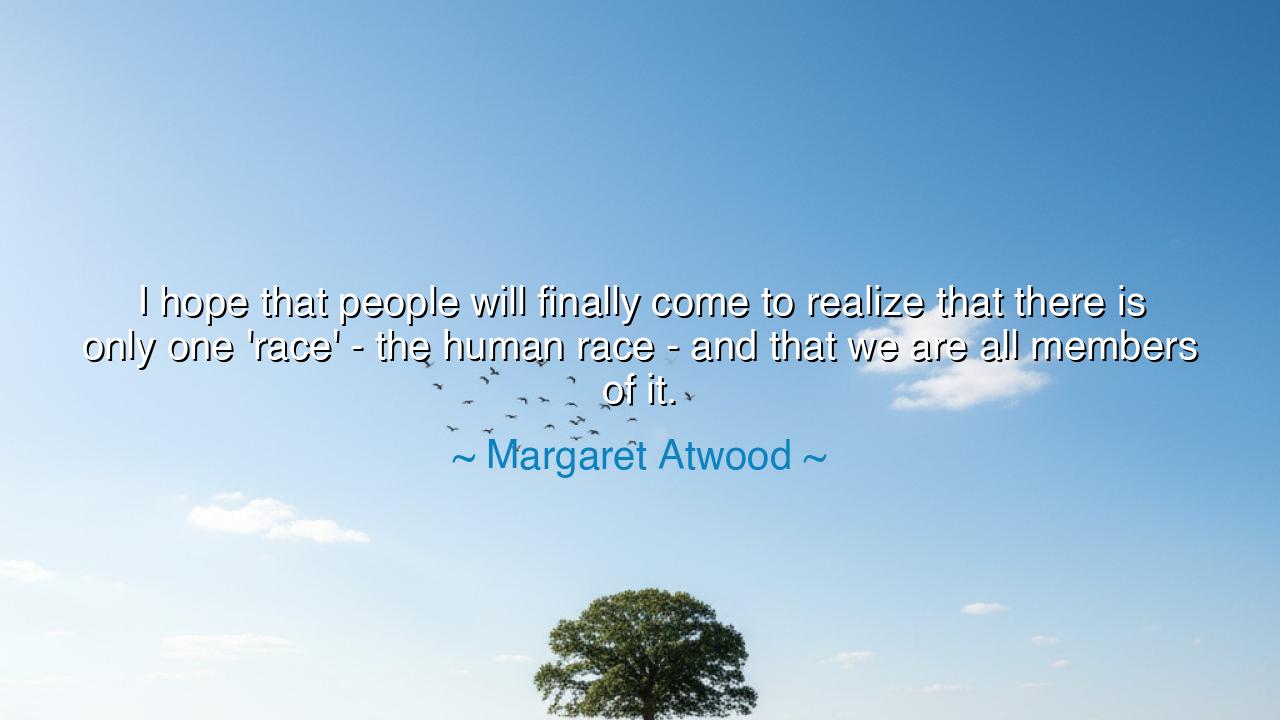
I hope that people will finally come to realize that there is
I hope that people will finally come to realize that there is only one 'race' - the human race - and that we are all members of it.






“I hope that people will finally come to realize that there is only one ‘race’—the human race—and that we are all members of it.” Thus spoke Margaret Atwood, the poet and seer of our time, whose words carry both lament and longing. In this declaration, she calls humanity to awaken from one of its oldest delusions—the belief that our divisions define us. With quiet power, she reminds us that beyond the veils of color, creed, and nation, there beats but one heart: the human heart. Her words are not merely a statement of equality—they are a cry for remembrance, a call to return to our shared origin, our shared destiny.
The origin of this truth is as ancient as humankind itself, though the world has often forgotten it. The idea of “race” is but a construct, a false hierarchy invented to divide what nature made whole. The first humans, born under the same sun, shared the same earth and air. Over time, they scattered across continents, their skin and features shaped by light, climate, and geography—but their essence remained the same. The blood that runs through the veins of a man from the East is no different from that of a woman from the West. The illusion of race was born not from nature, but from fear—from the human tendency to separate and to dominate. It is this illusion that Atwood urges us to cast off, to see again with eyes unclouded by centuries of prejudice.
When she says she “hopes” people will realize this, there is in her voice both faith and sorrow. For hope, to Atwood, is not passive wishing but an act of moral resistance—a belief that truth, though long buried, can rise again. She writes in an age still scarred by division, where lines are drawn not by rivers or mountains, but by the mind. Yet, her words carry the same fire that once burned in the hearts of prophets and reformers. They echo the voices of Martin Luther King Jr., who dreamed that his children would “not be judged by the color of their skin but by the content of their character,” and of Nelson Mandela, who endured 27 years of imprisonment to prove that forgiveness and unity could triumph over hatred. In Atwood’s hope lives the strength of all who have fought to remind us that we are one people, one tribe beneath the sky.
Consider the story of Mahatma Gandhi, who led India’s struggle for freedom not through weapons, but through the power of unity. He looked upon the British oppressor not as a different species, but as a fellow soul, and believed that truth and compassion could bridge the deepest divide. Or think of Rosa Parks, whose quiet defiance on a bus in Alabama became a spark that ignited a movement. Each of these acts was rooted in the same truth that Atwood speaks: that the dignity of one is the dignity of all, and the wound of one is the wound of humanity itself. Through them, the world glimpsed what it means to live as one human race—diverse in form, but indivisible in spirit.
Atwood’s words also carry a warning, as all wisdom does. For while she speaks of unity, she acknowledges that ignorance and fear are stubborn adversaries. The walls between us are not only built of stone or law, but of habit and inheritance. Many cling to these walls because they fear what lies beyond—the vastness of shared identity, the responsibility of mutual care. To see humanity as one is to abandon the comfort of “us” and “them.” It is to accept that every injustice in the world, though distant, touches us all. Thus, Atwood’s call is not sentimental; it is revolutionary. It demands courage—the courage to look beyond the mirror of self and see in another’s face our own reflection.
And so, her teaching stands as both reminder and challenge: that identity must not divide but deepen our connection to the whole. To recognize the human race as one is not to erase our differences, but to celebrate them as expressions of the same creative force. Just as a garden is made more beautiful by its variety of flowers, so too is humanity enriched by its diversity. But if we divide the garden, if we pull one bloom from the soil of another, we destroy the harmony that gives it life. The wise must therefore learn to tend the garden of humanity with reverence and care, seeing in each person a fragment of the same eternal design.
So, my listener, take this wisdom into your heart: reject the illusion of separation. When you meet a stranger, see not difference but kinship. When you hear of suffering, do not turn away, for it is your own suffering reflected back to you. Educate your mind, but also your empathy. Speak against hatred, but also live in compassion. For every word of kindness, every act of understanding, becomes a thread that weaves the torn fabric of our shared humanity.
Thus, remember the hope of Margaret Atwood—a hope that stands like a beacon through the darkness of division: that one day we will awaken to our true belonging, not as races or nations, but as members of one human family. When that day comes, the walls will fall, and we will see at last that the miracle of humanity lies not in how we differ, but in how deeply we are the same.






AAdministratorAdministrator
Welcome, honored guests. Please leave a comment, we will respond soon